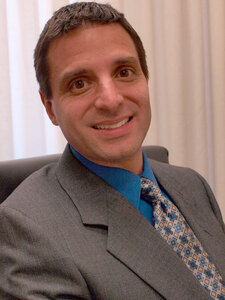University Advancement making plans to work with next administration
Many students know USC raises a lot of money from alumni and other donors, but few know about the person whose job it is to raise that money.

Money talks · Sam Lopez, USC’s new assistant vice president for advancement communications, will work with President-elect C. L. Max Nikias on future fundraising efforts. - Sunil Murali | Daily Trojan
For the past five weeks that person has been Sam Lopez, USC’s new assistant vice president for advancement communications.
“Fundraising is an art form,” Lopez said. “There are many ways it can be done. In the world of communications, we help get messages to the donors. We help connect the great ideas and talent of this university to its sponsors.”
Lopez said forming strong relationships between donors and the university is crucial to raising money.
“It’s about tailoring the message to the audience,” Lopez said. “We form partnerships between donors and what they care about. It’s like matchmaking.”
Though a major aspect of Lopez’s job is to raise funds for the school, his job also encompasses updating the school’s infrastructure. The Division of University Advancement constantly evaluates how the school does business and works to make enhancements that will raise the overall quality and cost-effectiveness of the university.
Re-evaluating the current infrastructure is especially important now, Lopez said, since USC’s administration will be facing changes upon President Steven B. Sample’s retirement. He has to ensure the office of advancement is working to meet the needs of the current administration, as well as the next.
“USC raises a lot of money,” Lopez said. “We’re one of the top universities for that, and we don’t want to lose that momentum.”
Courtney Surls, vice president of development, said a smooth presidential transition is something the Division of University Advancement has been preparing for the past two years.
“We know that [Nikias] has a bold vision for the future that will build on everything President Sample has already done,” Surls said.
Nikias’ aspirations for USC include doubling the size of the school’s endowment.
“He’s very focused on fundraising,” Surls said. “We’re making sure we have our systems and procedures aligned, that we have the right people in place, that it’s a very professionalized system.”
Peter Lasher, associate senior vice president for development, agreed.
“[Nikias] is coming in with a very ambitious plan,” Lasher said. “We have to help translate it into different donor postulations and help them understand how their private donations will make a difference.”
Lopez’s job is also made more difficult by the recent economic crisis, which has affected schools’ fundraising all across the nation.
“USC donations dropped 9.8 percent last [fiscal] year,” Lopez said. “It was still less than the national average, which was 11.9 percent. But as confidence in the economy returns, so will philanthropy.”
Lopez, however, said the biggest challenge facing USC isn’t fundraising at all, but changing certain perceptions about the school.
“Our biggest challenge is overcoming the perception that we don’t need resources,” Lopez said. “Without the support of alumni and friends, this place wouldn’t have the quality of education, research, academic programs, sports and more, that it has. It would be devastating.”
Lasher said the office needs to ensure that every small donation goes appreciated.
“Sometimes when we think about donors, we think about a big monolithic group,” Lasher said. “But we’re expecting a different kind of generation, and the practices we’ve traditionally used are evolving.”
Lopez, who’s been working in higher-education communication for 16 years and at three other universities, added that working in the division of university advancement has been great so far.
“There’s a lot of collegiality among advancement staff,” Lopez said. “A university is many pieces, and one area helps raise other areas.”
Though most students don’t know anything about the division of university advancement, it’s a function that all schools have and Lopez is more than happy to spread the word.
“The future philanthropists are current students, so it’s great to spread the word about what we do,” Lopez said.
